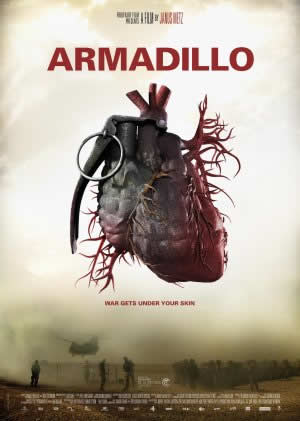 NEW YORK, NY- Lorber Films announced today the acquisition of U.S. rights to ARMADILLO, the controversial documentary by director Janus Metz that provoked furious debate in his home country of Denmark, as well as an inquiry by the Danish government into the actions of the soldiers captured in the film in a deadly skirmish with Taliban fighters. The film has sparked robust discussion in the international press about the rules of engagement and thrill-seeking behavior of young soldiers fighting in Afghanistan – and beyond. In journalistic style par excellence, Metz gained intensely intimate access to his subjects before their deployment, and then embedded himself with their combat unit at “Armadillo,” the forward operating base in Afghanistan’s perilous Helmand province. Surpassing comparisons to other documentaries, ARMADILLO evokes some of the great war films of modern cinema. This spring, ARMADILLO was the first documentary to screen in the Critics’ Week competition at Cannes, and after winning the Critics’ Prize there went on to garner the prestigious Grierson Award at the London Film Festival as well as an unprecedented honor of six Cinema Eye nominations, with winners to be announced in January.
NEW YORK, NY- Lorber Films announced today the acquisition of U.S. rights to ARMADILLO, the controversial documentary by director Janus Metz that provoked furious debate in his home country of Denmark, as well as an inquiry by the Danish government into the actions of the soldiers captured in the film in a deadly skirmish with Taliban fighters. The film has sparked robust discussion in the international press about the rules of engagement and thrill-seeking behavior of young soldiers fighting in Afghanistan – and beyond. In journalistic style par excellence, Metz gained intensely intimate access to his subjects before their deployment, and then embedded himself with their combat unit at “Armadillo,” the forward operating base in Afghanistan’s perilous Helmand province. Surpassing comparisons to other documentaries, ARMADILLO evokes some of the great war films of modern cinema. This spring, ARMADILLO was the first documentary to screen in the Critics’ Week competition at Cannes, and after winning the Critics’ Prize there went on to garner the prestigious Grierson Award at the London Film Festival as well as an unprecedented honor of six Cinema Eye nominations, with winners to be announced in January.
Lorber states, “ARMADILLO literally explodes on the screen. Unlike any other war documentary I’ve ever seen this astute exploration of the culture of war matches young soldiers’ hyper state of mind with the filmic correlative-like Apocalypse Now it’s pure cinema on steroids.”
ARMADILLO took audiences by surprise at this year’s Cannes Film Festival when it became the first documentary to screen in the Critic’s Week competition, then took the top prize in that section. The film follows Danish soldiers fighting the Taliban in the Helmand province of southern Afghanistan. We’ve grown accustomed in the last decade to depictions of improvised explosive devices, missile strikes and other remote control warfare. But in Armadillo (named for the platoon’s base camp) we’re plunged into close combat that evokes wars of past eras, particularly Vietnam.
Director Janus Metz maintains a sophisticated visual flair that’s rarely achieved in such extreme conditions, while building the film around distinct characters within the platoon, such as the boyish Mads – whose middle class family expected him to keep peace in Kosovo, not fight in Afghanistan – and the more battle-hardened platoon leader, Rasmus. Through their six-month tour of duty we witness how war transforms different personalities. Metz draws closer and closer to these soldiers, with an intimacy equal to a work of fiction. That blurring of lines forces the question: what does the viewer seek in a war film? Political insight or human drama? Condemnation of brutality or celebration of valour? Armadillo prompts these questions while leaving it to the audience to determine their own answers. Thom Powers – Toronto International Film Festival

